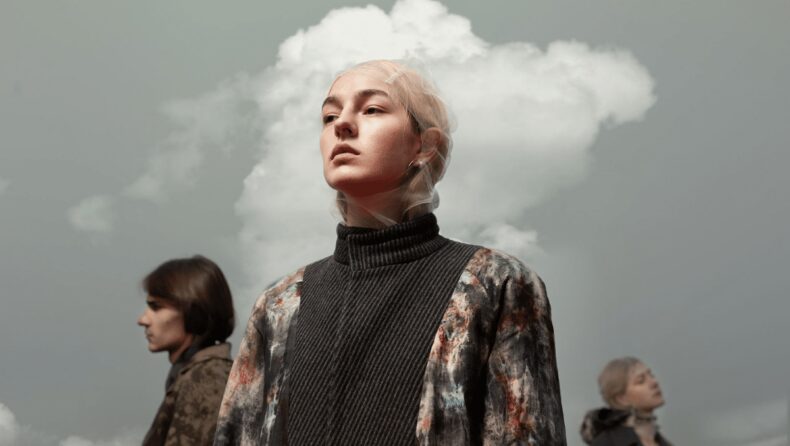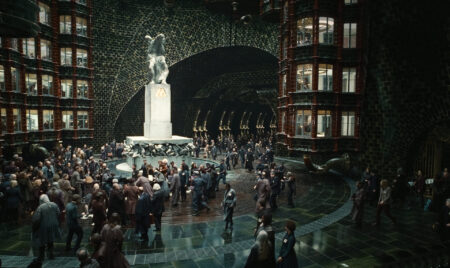“Fashion is communication with the world—it shows we are strong and can keep going”, says Iryna Kokhana, a Ukrainian designer who had to migrate to London when the conflict broke out.
She is presently exhibiting her creations at Paris Fashion Week, seeing it as an opportunity to promote not just her brand, but also the strength of her nation.
“We’re all battling,” she tells the BBC. “It’s to demonstrate our people’s tenacity, abilities, and capacity to produce even while everything is coming apart during the war.”
Kokhana is the creator and CEO of the Lviv-based label Chereshnivska, which borders Poland. She wasn’t in Ukraine when Russia invaded in February since she was showing at New York Fashion Week, but her workers and family were.

“My sister was posting videos and photographs of people rushing down the street; it was terrible,” she tells the BBC. “They couldn’t receive money from the banks, and there was a long line at the ATM, so I sent them money from abroad. I attempted to assist each individual. ” It was all about survival for the first five days. Getting money, buying tickets, and locating a car to drive someplace.
Kokhana’s workshop in Lviv was closed for a few months, so she moved to London, where she had some contacts. However, her company is back up and operating after several employees elected to return home.
So she runs her label from the United Kingdom, having updated her website and changed the Ukrainian currency to the pound. Her work, as well as that of other Ukrainian designers, is being marketed by Jen Sidary, a former head of sales at Vivienne Westwood America.

“We received quick attention because of Jen and showing in New York and now Paris,” the designer explains.
They’re both in Paris, along with the other Ukrainian designers pushed by Sidary, and their enthusiasm is evident.
“It’s incredible to be here,” Kokhana adds. “This is a huge chance for us to display what we’re doing and be in the company of all these great businesses.” Some of the other designers agree, with Oliz adding, “Being part of the showroom in Paris already signifies the cultural win to be heard and seen globally.”
Frolov, another designer, believes it demonstrates the “great effort of our team, who developed this collection in Kyiv, despite conflict, incessant sirens, and shellings.” Her fascination with its fashion began prior to the war, during the COVID epidemic. My buddy who lives and works in Kyiv encouraged me to pay him and his husband a visit. “My friends and relatives thought I’d lost my mind,” she chuckles, she was fascinated when she found Ukraine’s fashion industry.
“In my nearly 30 years in the profession, I had no idea there was much potential hidden in this nation,” she adds. She made the decision to begin promoting Ukrainian fashion, and when conflict broke out, it became a mission for her. The quickest and most efficient method to accomplish this was to launch her website, which currently has “35 of the greatest, most exclusive Ukrainian fashion firms on one platform,” she boasts.

“They’re very amazing—Ukraine’s designers embraced sustainability well before many other countries. Their attention to detail is unparalleled. They may create their own collection and have it delivered to you in two months or less. Sidary now has a waiting list of roughly 70 designers who want to be included on her website, but as a start-up, they have “limited resources.”
“It feels so fantastic to be able to do this and assist Ukraine in a manner that most people don’t have the opportunity to,” she says of her new line of work.
Chereshnivska, a unisex company created in Ukraine in 2016, boasts vibrant designs with eye-catching patterns, many of which are drawn by its creative director, Anastasiya Rozova. According to Kokhana, their art communicates a tale.

On their Instagram feed, one set of clothes is characterised as depicting individuals transitioning from “vulnerability and anxiety to acceptance and struggle.”
Kokhana continues, “We just wanted to depict how Ukrainians felt when the conflict began—terror and powerful emotions. People were terrified. People couldn’t determine what to do next since we displayed it in brilliant colors. ”
“After that, people resumed their normal lives, even during the conflict. Having coffee with pals It’s also frightening because Russians bomb every day, but we opted to depict it through prints of smoke and explosions, as well as gloomy and black tones. ” Because Kokhana thinks that “everyone wants to be equal”, the company is unisex, and she values the “freedom to be yourself and wear anything you choose.”

Her main goal is to make it environmentally sustainable, which includes using recycled materials, organic cotton, and green printing technology. By 2024, they hope to have 50% of their manufacturing created from recycled materials.
She can travel because she lives in London, but she finds it difficult. “It’s really different,” she remarks. “London offers many chances for business and learning, as well as a varied community. However, it does not feel like home.

“I’ve thought about moving back to Ukraine a few times, but I’m just very pleased that I have a chance with Jen to remain here, keep progressing, and pursue possibilities overseas,” she says.
She is particularly encouraged by the sight of “a lot of Ukrainian flags, even in cafés, you feel supported,” she says. However, she notes that it’s “not that simple to do business” in the UK, which is facing its own financial difficulties.
Her present slogan, on the other hand, is straightforward. “The essential thing is that we keep going”, she says. (Source: BBC)
Read More: Ukraine war: Putin signs Ukraine annexation laws amid military setbacks













